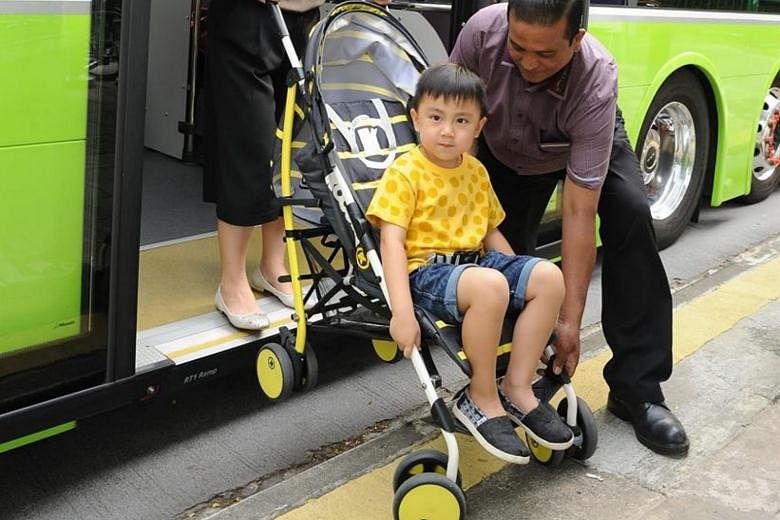SINGAPORE - An advisory panel tasked with making public transport more family-friendly has recommended a number of additions including stroller restraints on buses and transportation applications that help parents locate nursing rooms.
Co-chaired by Public Transport Council chairman Richard Magnus and Government Parliamentary Committee for Transport chairman Sitoh Yih Pin, the panel had reached out to more than 3,000 commuters. It took 10 months to come up with more than 20 recommendations which it submitted to Senior Minister of State for Transport Lam Pin Min on Monday (April 30).
They include allowing rear-door boarding of buses for people pushing open baby strollers; installing user-friendly stroller restraint systems; and training bus drivers to drive nearer to the kerb so as to make these "stepless" buses truly stepless.
The panel also recommended developing system maps and transport apps showing the availability of family-friendly features such as nursing rooms, changing facilities, exits with lift; and introducing more signage to guide parents to nursing rooms and diaper-changing facilities.
Also suggested - updating websites and transport apps to show scheduled and unscheduled lift maintenance; information on barrier-free taxi stand and boarding/alighting points.
The panel also recommended that all new taxi stands should be barrier-free.
Other recommendations include having a quiet room at MRT stations and bus interchanges for commuters with special needs; and building physical or virtual training facilities or a space "that allows all children with special needs to familiarise themselves with the transport system prior to travelling on public transport".
"Achieving a seamless, delightful, family-friendly transport system is a journey that the commuting public will take together with the Government and transport operators, as partners in transit," said Mr Magnus.
In a Facebook post, Dr Lam described the panel's report as "a labour of love".
"I was delighted to receive its report on their recommendations to make our transport network even more inclusive," he wrote.
"Singapore has invested much into the hardware of our public transport infrastructure and renewal works over the last few years, and today's Advisory Report on how to improve the heartware is very timely and appreciated."
Here are the 22 recommendations at a glance:
1. Allow rear door tapping for open strollers.
2. Improve awareness of rear-door boarding and tap-in through public education and training of bus captains.
3. Install user-friendly stroller restraint systems on public buses.
4. Improve training for bus captains to drive nearer to the kerb when senior citizens board and alight.
5. Introduce features that make public buses more accessible for the elderly, such as limiting the height of steps.
6. Develop system maps and transport applications showing the availability of family-friendly features such as exits with lifts and nursing rooms.
7. Introduce more signs to guide parents to nursing room and diaper changing facilities.
8. Update websites and transport applications showing scheduled and unscheduled lift maintenance.
9. Provide information on barrier-free taxi stand and boarding/alighting points on transport applications.
10. Set policy that all new taxi stands should be barrier-free.
11. Assess the demand and feasibility of providing more shelters at bicycle/scooter parking stations at MRT stations.
12. Provide more space for wheelchair users and open strollers, specifically at least two wheelchairs spaces, or one wheelchair and one open stroller space on buses.
13. Provide a quiet room at MRT stations, bus interchanges and integrated transport hubs for commuters with special needs and increase awareness that commuters may seek waiver of fines with station staff when they exceed the time limit due to special situations.
14. Raise awareness and help set-up physical or virtual training facilities or a space that allows children with special needs to familiarise themselves with the transport system before they use it.
15. Design a family-themed cabin during school holidays, as well as improve public education and signs to allow priority boarding for families.
16. Engage the members of the Government, community and schools to cultivate a caring commuting culture.
17. Develop procedures with transport operators to help commuters with special needs, especially during train service disruptions.
18. Improve procedures to specify protocol for helping wheelchair users to board or alight from public buses.
19. Cultivate a caring commuting culture towards people with invisible disabilities through public education.
20. Extend priority seats to commuters with invisible disabilities, such as people with long-term physical, mental, intellectual or sensory impairments.
21. Explore the scope of mobility as a service beyond integration of transport modes to include complementary services and features, such as a navigation guide.
22. The Government to review options to ensure open availability and inter-operability of transport data to create and safeguard a mobility as a service environment.


